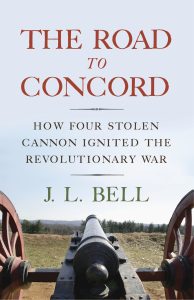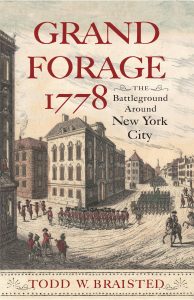With our finger on the pulse of great research and writing about the American Revolution, it seemed natural to launch a namesake book series. Early in 2015, we were fortunate to find a partner who shared our vision for publishing microhistories with meticulous, groundbreaking research and well-written narratives about unknown or lesser-known topics. The Journal of the American Revolution team has been working closely with two authors, J. L. Bell and Todd W. Braisted, on two exciting titles that will serve as the inaugural volumes of our series. The books will be available in a few short months and the Amazon pre-order pages went live last week, so we are pleased to formally introduce:
 The Road to Concord: How Four Stolen Cannon Ignited the Revolutionary War by J. L. Bell
The Road to Concord: How Four Stolen Cannon Ignited the Revolutionary War by J. L. Bell
[PRE-ORDER NOW]
In the early spring of 1775, on a farm in Concord, Massachusetts, British army spies located four brass cannon belonging to Boston’s colonial militia that had gone missing months before. British general Thomas Gage had been searching for them, both to stymie New England’s growing rebellion and to erase the embarrassment of having let cannon disappear from armories under redcoat guard. Anxious to regain those weapons, he drew up plans for his troops to march nineteen miles into unfriendly territory. The Massachusetts Patriots, meanwhile, prepared to thwart the general’s mission. There was one goal Gage and his enemies shared: for different reasons, they all wanted to keep the stolen cannon as secret as possible. Both sides succeeded well enough that the full story has never appeared until now.
The Road to Concord: How Four Stolen Cannon Ignited the Revolutionary War by historian J. L. Bell reveals a new dimension to the start of America’s War for Independence by tracing the spark of its first battle back to little-known events beginning in September 1774. The author relates how radical Patriots secured those four cannon and smuggled them out of Boston, and how Gage sent out spies and search parties to track them down. Along the way, the book recounts other previously untold developments that raised tensions in New England, such as the sailor who attacked two British army officers on a Boston street and the Patriot organizer whose sudden, mysterious death led to conflicting rumors of suicide and murder. Drawing on archives in the United States, United Kingdom, and Canada, the book creates a lively, original, and deeply documented picture of a society perched on the brink of war.
J. L. BELL is the proprietor of boston1775.net, a popular website dedicated to the history of the American Revolution in New England. A Fellow of the Massachusetts Historical Society and American Antiquarian Society, he is author of the National Park Service’s study of George Washington’s work in Cambridge, and has delivered papers to the Massachusetts Historical Society, the Organization of American Historians, and historic sites around greater Boston.
 Grand Forage 1778: The Battleground Around New York City by Todd W. Braisted
Grand Forage 1778: The Battleground Around New York City by Todd W. Braisted
[PRE-ORDER NOW]
After two years of defeats and reverses, 1778 had been a year of success for George Washington and the Continental Army. France had entered the war as the ally of the United States, the British had evacuated Philadelphia, and the redcoats had been fought to a standstill at the Battle of Monmouth. While the combined French-American effort to capture Newport was unsuccessful, it lead to intelligence from British-held New York that indicated a massive troop movement was imminent. British officers were selling their horses and laying in supplies for their men. Scores of empty naval transports were arriving in the city. British commissioners from London were offering peace, granting a redress of every grievance expressed in 1775. Spies repeatedly reported conversations of officers talking of leaving. To George Washington, and many others, it appeared the British would evacuate New York City, and the Revolutionary War might be nearing a successful conclusion. Then, on September 23, 1778, six thousand British troops erupted into neighboring Bergen County, New Jersey, followed the next day by three thousand others surging northward into Westchester County, New York. Washington now faced a British Army stronger than Burgoyne’s at Saratoga the previous year. What, in the face of all intelligence to the contrary, had changed with the British?
Through period letters, reports, newspapers, journals, pension applications, and other manuscripts from archives in the United States, Canada, United Kingdom, and Germany, the complete picture of Britain’s last great push around New York City can now be told. The strategic situation of Britain’s tenuous hold in America is intermixed with the tactical views of the soldiers in the field and the local inhabitants, who only saw events through their narrow vantage points. This is the first publication to properly narrate the events of this period as one campaign. Grand Forage 1778: The Battleground Around New York City by historian Todd W. Braisted explores the battles, skirmishes, and maneuvers that left George Washington and Sir Henry Clinton playing a deadly game of chess in the lower Hudson Valley as a prelude to the British invasion of the Southern colonies.
TODD W. BRAISTED is a past president of the Bergen County Historical Society, an honorary vice-president of the United Empire Loyalist Association of Canada, and a Fellow of the Company of Military Historians. He has authored numerous articles and books on the American Revolution, and has appeared on such shows as PBS’s History Detectives. His website, royalprovincial.com, is a leading source for Loyalist information. He lives in New Jersey with his wife, Susan.





Recent Articles
The Association of Cumberland County, North Carolina
Lydia’s Tale: The Mystery of Lydia Darragh, Irish Quaker, Patriot Spy
Lt. Elijah Evans of Maryland: Unresolved Promotion in an Extra Continental Regiment
Recent Comments
"The Evolution of the..."
This article is a gem. Sparkling. Excellent research. Wide and deep. Thank...
"The Evolution of the..."
A very interesting article, thank you! A more general question, if you...
"The Evolution of the..."
Thoroughly researched and a succinct presentation, especially given the article's breadth.